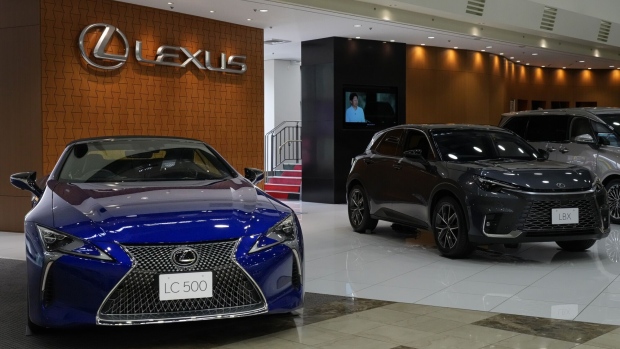Jun 28, 2024
Toyota Said to Seek Wholly Owned Lexus Factory in Shanghai
, Bloomberg News

(Bloomberg) -- Toyota Motor Corp. is in discussions with authorities in Shanghai about the possibility of constructing a wholly owned factory, according to people familiar with the matter, in what would be a risky gambit for the Japanese automaker at a time it’s struggling in China.
Toyota is negotiating for treatment similar to what Tesla Inc. received, including tax breaks, policy support, land grants and, unusually for China, the ability to own and control the facility outright without the need for a local venture partner, the people said, asking not to be identified because the discussions are private.
The world’s no. 1 automaker would use the factory to produce electrified cars for its premium Lexus brand, the people said. Authorities in Shanghai are open to attracting more foreign investment from a major company but would probably need central government sign off, one of the people said, meaning the discussions are far from final and could change.
Toyota declined to comment. The Information Office of the Shanghai government didn’t immediately respond to a request for comment.
Although like most foreign automakers Toyota has been fighting lackluster sales in China amid intense local competition, Chief Executive Officer Koji Sato embraced a “battery electric vehicle first” approach after his appointment in April last year. Under that strategy, Lexus is seen as the tip of the spear in the carmaker’s push to roll out millions of EVs within the next few years. In October, Sato unveiled a concept Lexus EV during the inaugural Japan Mobility Show.
Sato has since clarified that battery electric cars are just the “missing piece” to Toyota’s “multi-pathway” approach, which seeks to offer consumers a choice of power trains including gasoline, battery electric, hydrogen fuel cells and synthetic fuels. The automaker is aiming to sell 1.5 million EVs annually by 2026 and 3.5 million by 2030.
Since it debuted as a US-market focused upscale offshoot of Toyota more than three decades ago, Lexus has become a global brand with more than a dozen models, including sports sedans, SUVs and even a minivan. The brand announced its entry into the Chinese market in 2004, and last year sold 181,411 vehicles there.
Toyota makes Lexus models at factories in Japan and North America, and all are fully owned by Toyota. Of the 840,681 vehicles that Toyota sold worldwide in May, Lexus accounted for 8.6% of those and the majority were exported to North America and Asia. That same month, Toyota sold 13,229 battery EVs, including ones carrying the Lexus badge.
The company doesn’t break out profit from its luxury brand, but automakers typically earn fatter margins from their high-end cars because they sell for premium prices and come loaded with expensive features such as leather seats.
In China, Toyota is facing a hostile price war and spirited competition from local brands like BYD Co. That’s seen sales growth stagnate or drop for most Japanese automakers. Despite its top status globally, Toyota’s shipments in China have registered consecutive annual declines for the past three years. The automaker’s monthly sales in China in May fell nearly 14% from the year prior, even though it rolled out a new Camry.
--With assistance from Chester Dawson and Nicholas Takahashi.
©2024 Bloomberg L.P.





